Strategy statistics overview
At Cascade, we love data. Having the numbers to help see where you are, assess what's happening, understand how you got there, and decide what to do next, is a core principle behind the Cascade system and why we built it in the first place.
Strategy and its implementation are wide concepts that cover a lot of ground, and although pretty much everyone intuitively agrees that:
a) having a good strategy, and b) implementing it well,
are obviously good things for an organization, it's not always easy to find numbers to demonstrate this, or help guide your thinking and make your case around new strategic planning.
So, with that in mind, we wanted to pull together some stats for you. We've gathered them from multiple sources (including from surveys of our own followers), and we hope that whether you're trying to clarify things in your own mind, or guide the thinking of your boss, your team, or your wider organization, there is something useful here for you.
To help, we've brought them together in 3 categories that align with what we hear from our community (and also added a couple of the key lessons we see coming through):
- Strategic Planning and Implementation
- Organizational Culture
- Performance and Monitoring
Strategic planning statistics
50% of leaders rated implementation as equal in importance to strategy
68% believe their organization is good at developing strategy, down from 80% in 2012
98% of leaders think strategy implementation takes more time than strategy formulation
61% of respondents acknowledge that their firms often struggle to bridge the gap between strategy formulation and its day-to-day implementation
67% of leaders believe their organization is good at crafting strategy but only 47% believe their organization is good at implementing strategy.
Only 2% of leaders are confident that they will achieve 80-100% of their strategic objectives
33% of leaders rate their organization as poor or very poor at implementing strategy
Only 68% of leaders believe their organization is good at developing strategy
50% of leaders rated implementation as equal in importance to strategy
67% of well-formulated strategies failed due to poor execution
4.5% of strategy potential is lost to poor action planning
40% say their company is good or excellent at feeding lessons from successful strategy implementation back into strategy formulation
In an alarming 49% of organizations, leaders spend only one day a month reviewing their strategic implementation.
39% say one of the main reasons strategic initiatives succeed is skilled implementation
Only 10% of organizations surveyed achieve at least two-thirds of their strategy objectives, with 36% achieving between 50%-67% and 54% achieving less than 50%.
Only 41% of respondents say their companies provide sufficiently skilled personnel to implement high priority strategic initiatives.
Only 18% say that the hiring of people with the necessary business skills or leadership talent to drive strategy implementation is a very high priority at their firms, and a mere 11% say the same of developing those skills among existing executives.
30% cite failure to coordinate across units as the single greatest challenge to executing their company’s strategy
73% of ‘best strategy executors’ have been successful executing strategic initiatives in last three years, versus 53% of all other companies
Key Lesson:
It's harder to implement than to formulate
This lines up with what we hear from our customers every day. Coming up with a decent plan that would work if implemented well doesn't automatically mean that your plan is structured to support implementation, and that you're actually going to get it done. Good strategic ideas and direction are key (you'll get nowhere without them), but the hardest things are:
- Turning those ideas into an implementable plan (something that you can manage, track, and evolve)
- Getting everyone on the same page (up front about the plan, and then during execution)
- Integrating the work in to BAU so that it actually happens
Organizational culture statistics
These stats involve questions around communication and engagement with the strategy, which ultimately is a commentary on the organizational culture...
42% of managers and 27% of employees get access to the strategic plan
95% of employees do not understand their organization's strategy
84% of all staff members are clear on their organization’s top priorities
44% rank aligning the implementation of strategy to company culture as toughest challenge
80% of the workforce’s primary motivators for putting extra energy into the change program are not tapped into by the leaders
Past performance is two or three times more likely than a track record of collaboration to be rewarded with a promotion
73% of successful companies have a formal mechanism to communicate their strategy
Fewer than 33% of senior executives’ direct reports clearly understand the connections between corporate priorities, and 16% frontline supervisors and team leaders do
60% of leaders think less than 20% of the work force has at least a basic understanding of company strategy and can explain it
37% say gaining peoples’ support across the whole organization is the toughest implementation challenge
Nearly 90% of middle managers believe that top leaders communicate the strategy frequently enough
30% say communicating change is the toughest challenge
25% say one of the main reasons strategic initiatives succeed is the ability to manage organizational change
45% say ensuring staff members take different actions or demonstrate different behaviors is the toughest implementation challenge
20% of staff members resist implementation initiatives. The group showing the most resistance (51%) is middle management
In 2016, the top three reasons strategy implementation is failing are 1) Poor communication, 2) Lack of leadership and 3) Using the wrong measures
25% say one of the main reasons strategic initiatives succeed is good communication
5.2% of strategy potential is lost to poor communications
28% say one of the main reasons strategic initiatives succeed is being able to attract skilled personnel
65% of companies are ‘somewhat ineffective’ or worse at introducing change caused by strategic initiatives
20% believe their company would promptly address workers that don’t collaborate with colleagues but do reach their objectives. 60% believe it would be addressed inconsistently or after a delay, and 20% believe it would be tolerated
Key Lesson:
Communicating and handling change is cultural, and we're not great at it
A culture of communication, a culture of accountability, and a culture of creating the opportunity for positive change and then embracing it. Clearly, these things make a difference. As an organization, you need to make a point of:
- Communicating your strategy. Make it visible, make sure people know where and how they fit in, talk about what's going well and what isn't. Even if they don't understand every element, you should have a target that everyone in your organization understands where they fit in and why their contribution is valuable.
- Leaders owning the objectives and activities in your plan. Build that 'accountability culture'. If you've agreed on a plan, and that the plan is appropriate, your leaders have got to take responsibility for what's in it.
Don't kid yourself though, this is a two-way street - taking true ownership of getting these things done will mean them needing to drop or demote other things. For this to be real, there will be some hard decisions. - Creating the environment for change. It's hard to embrace change if you don't feel the impacts have been thought through. It's hard to embrace change if you think that the bosses will change their minds in 6 months anyway.
It's hard to embrace change if you don't think that there will be support and collaboration. Addressing these things will help you build a culture that embraces change.
Strategic performance and monitoring statistics
These stats revolve around organizations' ability to track and measure the desired outcomes from their strategic plans...
25% say measuring implementation is the toughest challenge
11% of companies employ a "fully-fledged" strategic control system
70% of organizations that used a formal process to manage strategy out-performed their peers
77% of successful companies have an established mechanism to translate their strategy into operative terms and evaluate it on a day to day basis
80% of the companies have at least one formal system for managing commitments across silos but 20% of managers believe that these systems work well all or most of the time
75% of successful companies have a formal and pre-established system to inform on and manage their strategy.
11% of ‘best strategy executors’ say there is no specific method or process by which lessons learned are fed back into strategy formation, versus 37% of other companies.
60% of organizations do not link their strategic priorities to their budget
70% of middle managers and more than 90% of front-line employees have compensation that is not linked to the strategy
64% of successful companies build their budget based on their strategy, rather than on past behaviors
66% of HR and IT teams develop strategic plans that are not linked to the organization's strategy
Key Lesson:
If you don't monitor and track, you don't succeed
You'd think it would be glaringly obvious, and what's more it's what we've seen and heard constantly from our community over the years, but if you don't manage to and measure how you're doing against your strategy, the chances are it will just be a slide deck or pdf that carries less and less relevance as people drift back towards their previous BAU state.
Organizations successfully implement their strategies through forcing themselves to create something implementable, having a formal mechanism for monitoring that implementation, and then being honest with themselves about what is actually getting done, how well it is getting done, and what needs to be refined to get back on track.
Is it all bad news?
Most of the stats we shared are not exactly encouraging. There is a definite challenge in the strategy space, sometimes in the planning stage, but certainly in the implementation stage.
Most of the stats we see are symptoms, but they give an indication of the underlying causes. Key among them being that we do not think or talk enough about IMPLEMENTATION.
So few organizations give this area enough focus (we've fought this battle ourselves at Cascade, and seen many customers come to Cascade as part of their solution).
Surprisingly, strategy implementation has received little attention. One extensive literature review indicated that, on average, only two to three articles on the topic appeared per year in recent decades across all academic journals covered in the leading scholarly indexes. It also receives little attention in the business press.
This is one of the key reasons why Cascade exists!
By having an environment exclusively focused on strategy at every stage (planning, managing and tracking), the system not only helps you to stay on top of your strategy, but it also forces you to make corrections at those crucial steps during implementation and execution.
The best thing is that you do not have to have a multinational organization to take advantage of the platform:
- Still at planning stage? Our Starter package will give you all the tools you need.
- Ready to start implementing with your team? Our Teams package will give you all the tools you need.
- Implementing across various business units and wanting a more customized experience? Talk to the team about our Enterprise solution.






.png)
.jpg)
.jpg)



